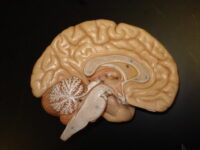When you’re sleeping, your brain starts sorting. It has the important role of deciding whether the memories you made that day are worth saving or throwing away. If you get hired for a new job, your brain will store that information, but what time you put your left sock on this morning isn’t on the need–to–know list.
The longer you sleep, the more time your brain has to sort through your memories. With less than seven hours of sleep, the brain doesn’t have enough time to process the day’s events. The length and quality of sleep play a crucial role in long–term memory; insufficient sleep risks memory loss and potential brain damage.
For every new experience, neurons fire in the hippocampus region of the brain, building neural networks that are pivotal in memory formation. During sleep, long–term memories are formed through the repeated firing of these new neural networks, creating synaptic connections responsible for recording, storing, and retrieving memories.
These synaptic connections, or bridges between neurons, act as paths. The more they are used, the stronger the connections become — just like how it’s easier to walk down a cleared path in the woods carved out from high activity compared to an overgrown, unused one. The stronger the connections, the more defined a memory becomes, and the easier it is to retrieve.
This process of developing strong synaptic connections is called long–term potentiation (LTP). It is responsible for developing vivid memories and transferring short–term memories into long–term storage. There is a hierarchy to choosing which memories are saved and which aren’t. Experiences with powerful emotions, strong external stimuli, or intense internal states such as hunger, stress, or deep concentration are more likely to be moved into long–term storage.
LTP’s inverse is long–term depression (LTD) — the process in which synaptic connections are weakened or deleted, resulting in fading memories or memory loss. Just like a phone, brains have a limited storage capacity; there are only so many memories the brain can store until it becomes disorganized and cluttered. LTD isn’t the bad guy, it’s just decluttering unused memories so the memories that matter — like how to tell time — are clear and easy to retrieve.
In a study published in June 2024, a team of researchers found that poor sleep disrupts these processes. Memories are strengthened during sleep through the repetition of synaptic connection firing patterns. Insufficient sleep prevents the repeated firing of synaptic connections needed to process and transfer memories into long–term storage. Without repetition, synaptic connections weaken, and memories become disorganized.
Sleep deprivation doesn’t just affect memory organization during sleep, but it rolls over to the next day. The brain flags an important experience as it happens to ensure LTP transfers it into long–term storage. Without enough sleep, however, the brain can’t efficiently flag experiences, preventing memory formation.
Insufficient sleep also impairs learning because the brain intakes new information by creating memories. Facts can’t be retained because the brain can’t transfer them into long–term storage. Thus, pulling an all–nighter to study for an exam sometimes causes more harm than good.
Sleeping in over the weekend doesn’t make up for missed hours; the damage is done. Just one night of insufficient sleep can weaken important and future memories.
- Nature (2024). DOI: 10.1038/s41586-024-07538-2
- Nature (2024). DOI: 10.1038/d41586-024-01732-y
- Clocks & Sleep (2023). DOI: 10.3390/clockssleep5020022
- Frontiers in Behavioral Neuroscience (2022). DOI: 10.3389/fnbeh.2022.806356
- Current Biology (2019). DOI: 10.1016/j.cub.2019.01.069
- Cold Spring Harbor Perspectives in Biology (2016). DOI: 10.1101/cshperspect.a016824
- Sleep (2015). DOI: 10.5665/sleep.4716
- The Journal of Clinical Investigation (2014). DOI: 10.1172/jci77888


